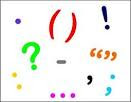Review:
Full Stop
=
Marks the end of a
sentence. Watch out for Run on Sentences!
Commas =
Separate items in a list, e.g. I like
apples, oranges, grapes and pears.
Separate connectives at
the start of sentences, e.g. Meanwhile, ...
Separate clauses in
complex sentences, e.g. The classroom, which was heaving with students, was getting stuffy.
The
Question Mark ?
Marks the end of a direct question. Example,
When will you be ready?
Marks the
end of a rhetorical question (used as a persuasive device where you are not
looking for an answer). Example, Wouldn’t you like to have hair as manageable
as this?







